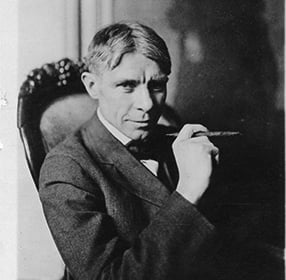From “The Windy City”
Winds of the Windy City, come out of the prairie,
all the way from Medicine Hat.
Come-out of the inland sea-blue water, come where they
nickname a city for you.
Corn wind in the fall, come off the black lands,
come off the whisper of the silk hangers,
the lap of the flat spear leaves.
Blue-water wind in summer, come off the blue miles
of lake, carry your inland sea-blue fingers,
carry us cool, carry your blue to our homes.
White spring winds, come off the bag-wool clouds,
come off the running melted snow, come white
as the arms of snow-born children.
Gray fighting winter winds, come along on the tearing
blizzard tails, the snouts of the hungry
hunting storms, come fighting gray in winter.
Winds of the Windy City,
Winds of corn and sea blue,
Spring wind white and fighting winter gray,
Come home here—they nickname a city for you.
The wind of the lake shore waits and wanders.
The heave of the shore wind hunches the sand piles.
The winkers of the morning stars count out cities
And forget the numbers.
This poem is in the public domain. Published in Poem-a-Day on July 28, 2024, by the Academy of American Poets.
This excerpt from “The Windy City” by Carl Sandburg appears in the anthology Poetry of Our Times (Scott, Foresman and Company, 1928), selected and edited by Sharon Brown of Brown University. In his article, “Not to Forget Carl Sandburg …” (The Sewanee Review, Winter 1977, Vol. 85, No. 1), literary critic Louis D. Rubin Jr. reflected on Carl Sandburg’s poetry, affirming, “[Sandburg’s way of using language] is much like prose in its syntax, and the colloquial vocabulary adds to an apparent casualness. In his best poetry Sandburg uses vernacular language, slang even; by this I mean that in Sandburg’s instance it isn’t the self-conscious employment of a ‘low’ vocabulary to call attention to commonness, a vaunting of plebeian virtue… Sandburg’s particular talent is that he opens up areas of our experience which are not ordinarily considered objects of aesthetic contemplation, through language that enables him, and us, to recognize such experience in new ways. […] He is, at his best, a poet of much subtlety and sophistication; and it is through the skillful intensification of language, not fresh subjects alone, that he works his art.”

